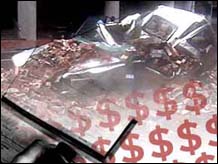|
|
| Gas crisis looms
|
 Experts fear near-term hit on economy from hurricane Katrina; say longer-term fallout less dire. (Full story)
Experts fear near-term hit on economy from hurricane Katrina; say longer-term fallout less dire. (Full story)
|
|
| More on Katrina's fallout
|
|
|
| Five tips
|
| What you need to know about insurance after a disaster. (Full story)
|
|
|
|
|
|
|
|

|
| CNN's Andy Serwer takes a look at who's giving what. (September 2) |
Play video
|
|
|
|
NEW YORK (CNN/Money) -
Americans already feel worsening daily gas pains. A few months, or even a few weeks from now, consumers could be dishing out more for grocery bills, too.
Coffee drinks, chocolate, fresh produce, detergents, paper and cleaning products are some of the items that analysts expect will cost consumers a more -- at least in the short-term -- in the aftermath of Hurricane Katrina.
At the same time, prices could ease for some other consumable products, experts said.
Nariman Behravesh, chief economist with economic forecasting firm Global Insight, says Katrina delivered a double-whammy to businesses and consumers.
First, the extensive damage to the region's oil, gasoline and natural gas infrastructure, immediately sparked a jump in the already elevated energy prices.
Second, Behravesh said the storm's impact on the region's vital seaports, railway and trucking infrastructure has the potential to seriously disrupt shipments of coffee, bananas and cocoa into the United States and shipping grain, wheat and retail goods to other parts of the country.
According to Economy.com, about $150 billion worth of cargo is shipped through the Gulf Coast region's seaports annually, accounting for about one-fifth of all U.S. imports and exports.
Louisiana's southern ports are the largest in the nation," said Mark Zandi, chief economist with Economy.com. "The Port of New Orleans alone imports 250,000 tons of coffee every year."
Besides coffee, it's also responsible for importing, storing and distributing other key commodities like steel, rubber, soybeans and aluminum, he said.
"Consumers will see higher prices on coffee beverages and even chocolate if the raw supplies get backed up at the ports," Zandi said. "In agricultural products, prices of cereals and breads could decline. If we can't export the wheat and grain, then the excess supply will have to be consumed domestically, pushing down prices."
The bigger price effect on consumers will come through higher energy and gasoline costs both for companies to manufacture products and ship them around the country.
Dave Ross, a supply chain expert with consulting firm Intentia Americas, says the shortage of gasoline will have an immediate impact on manufacturing, distribution and retail industries.
Industry watchers say truckers use 21 percent of all the fuels this country consumes.
Trucking companies hedge against gas price hikes by adding surcharges to manufacturers that ship raw goods and inventory and to retailers that need to delivery goods to their stores.
Retailers, including Wal-Mart (Research), which operates its own vast private trucking fleet, are already complaining that expensive fuel is squeezing their margins because of higher transportation and utility costs.
Typically, retailers will hold off for as long as they can to avoid passing along added costs to consumers. University of Maryland professor Peter Morici thinks that time might already be here.
"There will be some pass-through to consumers but it won't be huge," he said. "Gas prices will come down a little bit but they won't retreat to the levels they were at before Katrina hit."
Where does he see the price increases? "In the grocery channel and on some durable goods," he said.
Economy.com's Zandi is more pessimistic. "It could be on all retail goods if trucking costs go higher," he said.
---------------
Can consumers bear more gas pains? Click here to read more.

|